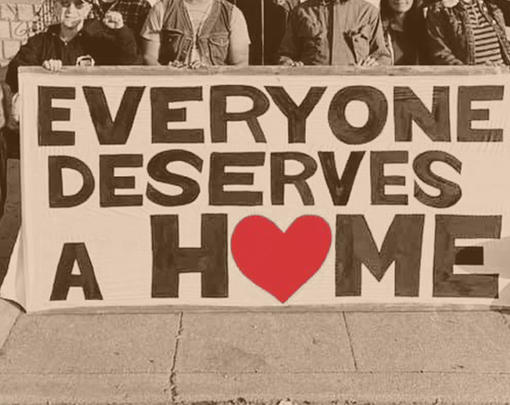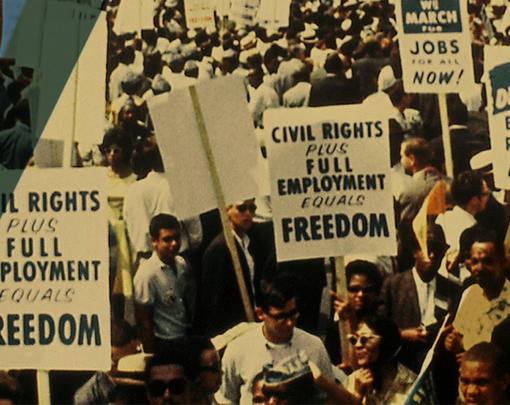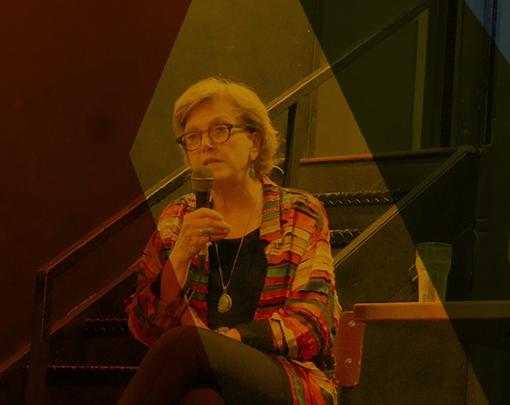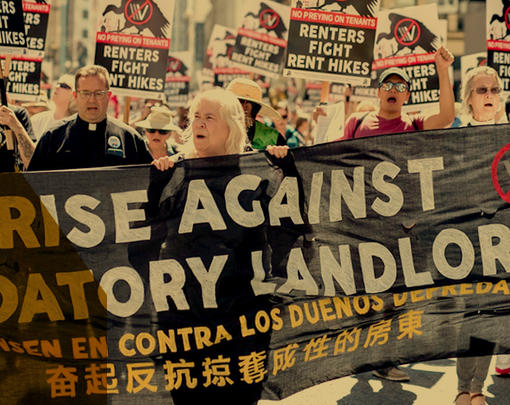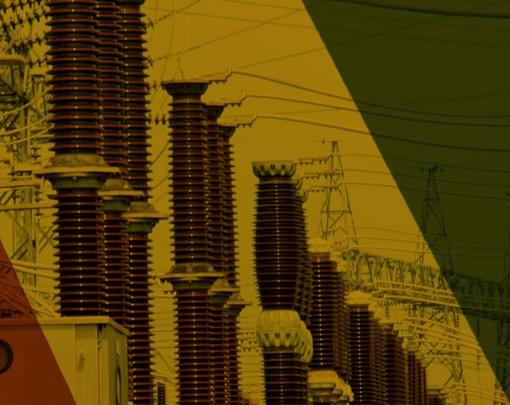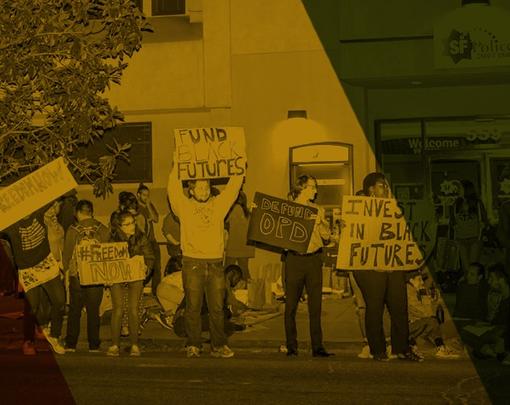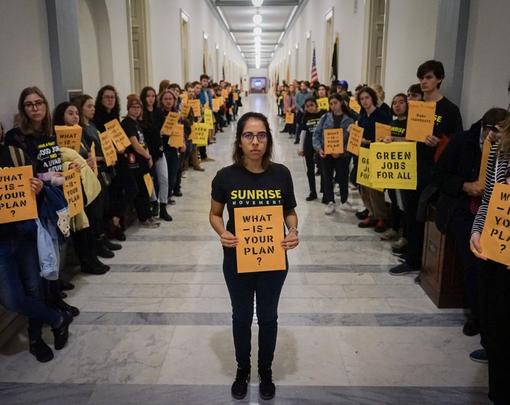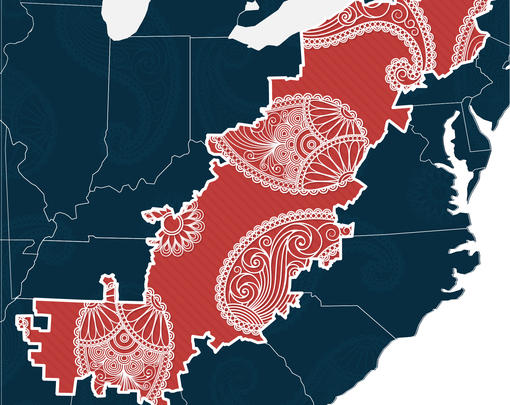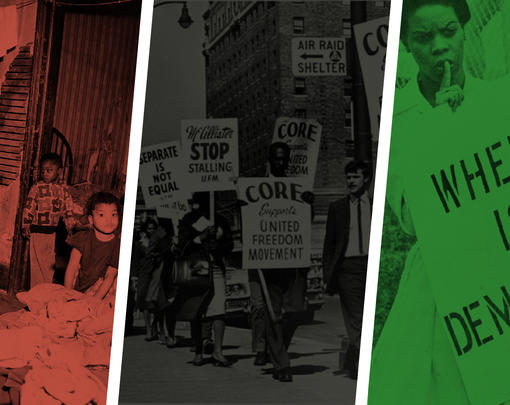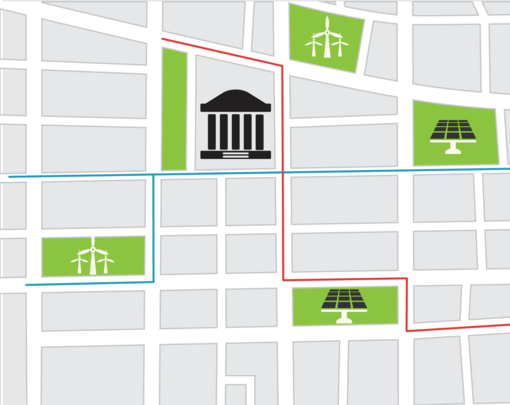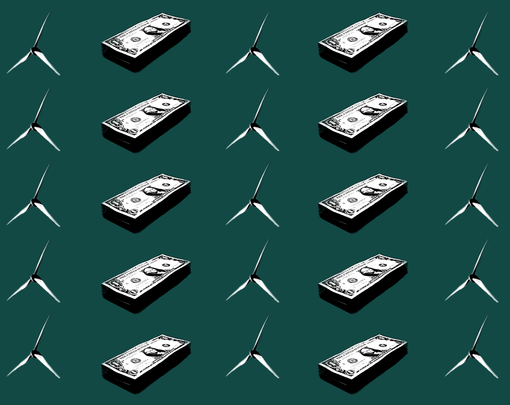This week on the Next System Podcast, Adam sits down with Darrick Hamilton to discuss his work on the racial wealth gap in the United States, as well as Hamilton’s proposal for a federal job guarantee program. This episode touches on economic planning, labor force dynamics, stratification patterns along race and gender lines, as well as workforce automation.
Subscribe to the Next System Podcast via iTunes, Soundcloud, Google Play, Stitcher Radio, or RSS.
Adam Simpson: Welcome back to the Next System Podcast. I’m your host, Adam Simpson. Today joining me is Professor Darrick Hamilton, a stratification economist that works as an Associate Professor of Economics and Urban Policy, while serving as the director of the Doctoral program in Public and Urban Policy at the New School in New York. He’ll be speaking with me today about his work on interrogating the racial wealth gap in the United States, as well as policy proposals for a federal job guarantee program.
Darrick, welcome to the Next System podcast.
Darrick Hamilton: Hi, thank you. Thank you for having me on your podcast.
Adam Simpson: It’s my pleasure. Before we begin talking about your work on the racial wealth gap and your proposal for a federal job guarantee program, I’d like to ask about your own trajectory, your own story. What lead you to becoming drawn to the issues that we’ll be talking about today, the issues that you’ve made a career out of studying, and that you’ve devoted so much of your time and intellectual effort toward?
Darrick Hamilton: I guess I would trace my trajectory back to grade school, and mention I had the good fortune of going to a school that emphasized not only academics, but ethical learning as well, a strong social justice orientation. I went to a Quaker school in Brooklyn called Brooklyn French School, so as a result of that good fortune, I think I was socialized to not just be interested in intellectual learning, but intellectual learning with a purpose towards making for a better world.
I think that and a keen sense of fairness. I lived in Bedford–Stuyvesant growing up, before it is the current form of Bedford–Stuyvesant, which is slowly going a sort of gentrification trend. Back then, I was exposed to some levels of poverty, as well as going to an elite private school, and I could see that really, there was not a great deal of difference between individuals. If you look at people, they were mischievous, good-natured, but that resources were a big issue. I’m really committed and interested in providing people with resources, so that they can reach their full potential.
Adam Simpson: Absolutely. And I feel like some of our listeners may not be immediately familiar with the term “stratification economist,” and I was wondering in your own words, what does that mean to you, when you describe yourself as a stratification economist?
Darrick Hamilton: Well, I think a lot of times in economics, we have subfields like labor, health, macro, et cetera, et cetera. Stratification economics is devoted to the study of how groups compete for preferred outcomes. So we’re very interested in race, very interested in gender. We don’t treat it as a periphery subject in a context of, say, health. We take it head on. In fact, when it’s treated as a periphery, it’s oftentimes just put in as a control variable without very much theoretical framing or understanding.
In addition, we think that economics as a discipline is limited in its understanding of persisting group-based inequality. Our overemphasis on individual optimization oftentimes ignores some of the structural issues related to group hierarchy, and group preferences for preferred outcomes—how you might privilege your own group relative to another group.
We borrow a lot from other disciplines. Sociology and the understanding of group inequality, group hierarchy. Social psychology to understand things like implicit bias, stereotype threat, how structures themselves can influence individual outcomes positively or negatively. We borrow from political science, to understand how political structures, laws, and customs themselves can manifest in ways that influence outcomes that lead to group-based inequalities.
We’re trying to build this field in economics so that the discipline itself can grow and learn from others, as well as take race, gender, other things like immigration, head on, rather than treat it as a periphery.
I’ll say one more thing about stratification. It’s somewhat ironic that in a field that’s often times criticized as being hyper-rational, that we treat something like discrimination as some taste or bias that should be rectified by the market, or sanctified by the market, because it’s non-productive over time. Well, stratification economics thinks that there’s a functional role to discrimination, and that that functional role might be intentional and strategic in trying to maintain social hierarchy. So it’s important to understand this if we want to combat it.
But you know, I should really give shout-outs to many others who came before me. I have the good fortune of doing this podcast, but I’m part of probably the second or third generation of economists that have been working in this field. I would put people like William Darity in there, Jim Stewart, Patrick Mason, Cecilia Conrad. I’ll name a couple others, I won’t bore your listeners, but-
Adam Simpson: No, it’s okay. No, our listeners might remember William Darity from a podcast we did with him on his reparations program, and we did indeed talk for a moment about the job guarantee program.
Darrick Hamilton: Great. Yep. And you know, I’ll name one other person, too, that oftentimes is … He’s in the canon of economists, he’s a Nobel Laureate, Sir Arthur Lewis. First black Nobel Laureate. The only black Nobel Laureate in economics, and I think he set a lot of the foundations for the work that we’re doing today in stratification economics.
Adam Simpson: Great. Well, I’ll make sure to capture all that for our listeners.
My next question is about your work on the racial wealth gap. It’s a work that you and many of the people who came before you who you just listed have worked on, and doing some background research before the interview, I was disturbed to learn that in my own home city of Washington, D.C., D.C. white households have on average 81 times the savings and assets of black households in their communities. That’s staggeringly and disturbingly high. Higher, I would assume, than most people would estimate without the benefit of your data and your research. In your own work, how do you begin to describe to people and explain to people the magnitude of this issue?
Darrick Hamilton: Yeah! It’s hard to grasp. I mean, I lead with, if we want to talk about financial agency over one’s lives, the story begins and ends with wealth. We often think of wealth as an outcome, but it really is an input that leads to all types of abilities, and human capabilities in one’s life. If you’re faced with an expensive legal matter, and you need to hire an attorney, then wealth will protect you in the legal system a great deal more than income. If you have a health ailment, and you don’t have insurance, you’re probably going to finance that out of your wealth. Similarly, if you want to go to elite schools, you’re going to finance that out of your wealth. If you want to purchase a home in a certain neighborhood to give you all sorts of amenities, you’re going to finance that out of wealth.
I like to make the distinction between what wealth can provide somebody, versus income, to just start off with the scope of understanding of wealth as an input, as something that gives people agency. I think that becomes a key factor in defining what wealth means. So that’s one aspect that I want to emphasize.
Then, as an outcome, if we look at blacks and whites, we can look at a lot of the progress that we had with regards to racial inequality over time, but the one factor that might be paramount, that has not really been proved since Antebellum slavery, and that is the racial wealth gap. It is as large as it’s ever been, and that, I think, really frames how unequal we are in America.
Adam Simpson: Right. Well, as you just said, this problem goes back to Antebellum America. I wanted to ask further about, in your mind, what are the social causes or systemic causes of this extreme wealth gap here in the United States?
Darrick Hamilton: Well, there was a period of time when blacks were literally the capital of whites, and that’s during slavery, so obviously there were head starts set about from that period. But if we look at the post-war and New Deal period, when we had things like FHA created, Fair Housing Authority, when we had things like the GI Bill, which provided people initial capital, so that they could purchase a home and have the appreciation of a home over time to build up their assets, so they can go to school debt-free. Well, these programs are characterized by the historian Ira Katznelson, as generating a white-asset-based middle class.
The problem is that they were not widely distributed in a way that blacks benefited from them, so blacks were largely excluded from these benefits. While a white-asset-based middle class was being generated, blacks were left behind. As a result, we still don’t have any wealth as a community to accumulate and build, and pass down from generation to generation. I can go into more details about that, but suffice to say that one of the biggest determinants of wealth is initial capital at a key point in somebody’s life, so that they can benefit from the purchase of an asset like a home that will appreciate passively over their lifetime, and blacks simply lack the initial capital to put themselves in such a viable asset to the extent whites have.
We could even talk about … So, that’s the asset side of it. Right now, we’re seeing that debt is becoming an issue as well, with things like, we encourage people to go get a college degree, so that they can pursue a life of economic security by getting a good job. But if you’re going to college and you’re accumulating a lot of debt, you’re also starting out in a hole. So we have another report where we look at the intersection of gender, age, and look at wealth and race, where we find that, for instance, young, college-educated, single black women start out with negative $11,000 in assets, and that probably has a lot to do with the debt that they accrue in getting that education.
I can go on and talk about for-profit colleges that often target certain marginalized and stigmatized groups. We can talk about things like fines that are increasing at the municipal level, which inhibit somebody from getting out of holes, so that they’re always constantly in a hole and basically stuck in a perpetual cycle of trying to get additional resources, and as they try to get those additional resources, the problems that occur during that period. We could talk about things like being evicted in addition to foreclosure, so it’s not just homeowners, it’s people in the rental market.
We have a whole structure that not only has not provided the initial capital for blacks to pass down from generation to generation, but a structure that entangles them with fines, fees, and debt in such a way that they’re stuck in a hole and a perpetual cycle of financial insolvency.
Adam Simpson: Right. You know, I regret that I didn’t have this written out for our interview today, but I recall seeing a study recently that demonstrated in cities where there was a higher African-America population, the city, in most cases, again, I don’t have the data in front of me, relied more on fines than other cities with a more homogenous, or more white American population in it.
Darrick Hamilton: That’s exactly right, but one of the other artifacts of having wealth: it provides political capital and political co-agency. You know, we emphasize voting in this country a lot, and we do want people to vote, and be heard, and take part in the political process, but there are other means of having political agency beyond voting, and wealth provides that. If I call a municipal agency or service, and they think of me in a certain way, then they’re going to be less responsive to me than they would somebody else who they might deem as having higher status, and wealth can provide you with a level of status, so that you can have greater influence on your municipality with things like fines and fees. We’re moving to an era where, basically, the state is even preying on individuals to balance their budgets.
Adam Simpson: Yeah. Now I want to turn to the federal job guarantee, but I think we’ll find that it’s not a wholly separate issue from racial inequality. But just to set the stage for that, how would you describe to someone, in your own words, the federal job guarantee, and what are the intentions and mechanisms by which this policy would operate?
Darrick Hamilton: Well, the federal job guarantee, first and foremost, provides every American who is willing and able the right to a job with dignity, for decent pay, a job that’s leading to productive capacities, that’s building up our physical and human infrastructure. So, that’s what it does first and foremost. But it does a lot more.
One, it removes the threat of unemployment. So, not only does it benefit workers who directly partake in the federal job guarantee, but for those workers that are dealing with the private sector, who are often vulnerable to being destitute with the treat of being unemployed, they have a little more bargaining power. Especially since our country is moving away from unionization and collective bargaining, workers are now often left at the whim to bargain with employers, but without a whole lot of recourse. So, it sets a floor on the bottom of the labor market, and it enables workers all across the labor market to have greater agency in negotiating the terms of their work.
It also provides an automatic stabilizer. As the macro economy goes through ebbs and flows, where we have growth and retraction, the federal job guarantee, during the period of decline, will likely increase in hirable workers, whereas in period of growth, we’ll find that the workers employed with the federal job guarantee will start to go into the private sector. So it provides an automatic stabilizer in that regard, and then it also will build up our crumbling physical and human capital infrastructure.
In the past when we had things like WPA and CCC, at the end tail of the Great Depression, or in response to the Great Depression, we built the nation’s infrastructure. We had lots of capital improvements, and clearly we need these capital improvements today, with our crumbling roads and bridges. But in the 21st century, we can think beyond just rebuilding our crumbling infrastructure, and talk about care work.
We can provide elder care. We can provide child care. We can improve health services. We can improve school services. We can also think about making our economy green. We can refit the whole American economy so that it’s more energy-efficient. We can reduce our carbon footprint. So, there’s a host of things we can do that the private sector is not currently doing that we can do.
I’ll say a couple of other things. It will reduce the strain on state budgets that can’t balance, that are restricted to having to balance their budget, even in hard times, but with the federal job guarantee, when we have a period of decline, the Federal Government can enhance spending on a local level, and maintain the tax base so that workers are still employed, so the state budgets won’t suffer so much during downturns.
And then, the last thing it does is … I mean, it does other things, but one of the things I’ll mention is that for populations that are often stigmatized or discriminated against, such as black workers who face twice the unemployment rate of whites at virtually every level of education, relief workers would have a job guaranteed for them, so it would mitigate some of the discrimination that takes place in our society. It would provide formerly incarcerated individuals who paid their debt to society the right to a job. And then, we think about the population that’s disabled, and often times come up with narratives about, hey, that they can’t work. Well, the federal job guarantee can facilitate work for this population also, who often can do more things than we attribute to them, as well as providing care to enable them to get into the work force.
Adam Simpson: Right, right. No, I have a lot of questions that arose out of that. I think, before we go just a little bit further, it occurs to me that the labor market, you mentioned how it has been changing. I hear a lot about the quote-unquote “fissuring” of work, and the rise of the gig economy, or quote-unquote “gig economy,” or I’ve also heard of it referred to as the “sharing economy,” which seems like an odd way of putting it, where there seems to be a growing amount of precarity in the private workplace. How do you think a job guarantee would interact with those trends?
Darrick Hamilton: Yeah, I mean, that’s important to know, especially since the Alan Krueger study … He had a co-author, and I can’t remember the co-author’s name, but they found that many of the jobs during the Obama administration were contingent work, or precarious work, as you have correctly described. Well, the federal job guarantee, again, sets the minimum floor on the labor market so that, for instance, if a federal job guarantee provides health insurance, then the private sector that wants to compete for workers will also have to provide health insurance or a similar package, or workers will have an alternative. So it competes with the private sector by setting minimum conditions by which they can hire workers, so workers will be less vulnerable.
I mean, if we want to talk about the sharing economy, and we believe that workers like the freedom and mobility to be able to do various things, for instance, drive Uber, well, let’s put this to test. Let’s really make this a choice for them. If there is a federal job guarantee where they have an alternative, then that’s indicative of a choice. If workers are moving into an industry, and they don’t have alternatives, you may characterize that as a choice, but in reality, that’s not really a choice.
Adam Simpson: A choice between working and being unemployed, yeah.
Darrick Hamilton: Exactly. So a federal job guarantee would really make it a choice, and if we believe that that’s a worker’s exercise in freedom, then that would really be displayed.
Adam Simpson: Yeah, and when you mentioned care work, elder care and child care … I do want to ask about racial inequality in just a moment, but when you mentioned care work as part of the job guarantee, I’m reminded of my colleague Cecilia Gingerich’s paper, Toward Gender Liberation, that much of that work is very gendered, and -universal child care program would have huge implications on gender inequality.
Darrick Hamilton: I mean, that is another important aspect to highlight. We have a structured society where that work is often relegated, or delegated, to women, and it does two things. One, this is important work that’s productive work, but it’s not often supplied with the dignity of a wage, and benefits, so a federal job guarantee would formalize this work and provide it with both a wage, as well as benefits that go along with other forms of productive work.
But the other thing that it will do, is that it will allow individuals who are primarily women the opportunity to do other things, because a labor force will be created so that they will have choice, or freedom to exit that former work and go into other areas that allow them to reach their human capacities, in terms of the work that they want to do.
Again, two things to highlight again, just to summarize: One, it frees women who otherwise had to do that work, because it wouldn’t have been done, do other things, and two, it provides the dignity of a wage, as well as benefits, for this work that’s being done.
Adam Simpson: Sure, sure. And moving towards the racial wealth gap, you’ve written, and I’ll have a link to this in the description, but you’ve written that a job guarantee would be a step toward ameliorating the racial wealth gap that we began this conversation describing. Could you elaborate on how you think a job guarantee would impact the racial wealth gap? Or racial inequality more broadly, perhaps.
Darrick Hamilton: Well, if I have written that somewhere, I should be corrected. I’m not sure-
Adam Simpson: I think I may have put words in your mouth. You talked about, I think I read, it was broader racial inequality, not specifically the wealth gap, because wealth is a specific term, and I shouldn’t have put that in your mouth, I don’t think.
Darrick Hamilton: But I think that’s important to know, right? So, the federal job guarantee is extremely important. I mean, it will address some of the issues that I mentioned with regards to debt by providing people with wages so that they’re not unemployed, or providing people with income so that they can maintain their homes that they’re in, even when there’s an economic downturn, so in that sense, the federal job guarantee can prevent some backsliding on wealth, but it doesn’t necessarily build assets, right? To build assets, my colleague William Darity and I have talked about baby bonds, and I’m happy to talk about that program as well.
But the key thing for wealth is you need access to some capital at a key point in your life, so that you can purchase that asset, like a home, that will appreciate, like some capital to start a new business, or a debt-free college education. That is how you get into an asset that will appreciate and provide you the economic security over a lifetime. A federal job guarantee will do a lot of things, but I don’t think that it will fundamentally change the racial wealth gap.
Adam Simpson: Right, not on its own, certainly. Why … So, I know that in the Freedom Budget designed by some of the activists of the Civil Rights Movement, the goal of full employment was very much a central goal of what was called the Freedom Budget. Why do you think that full employment was so essential to this platform, this concept?
Darrick Hamilton: I mean, they had the foresight to understand the right to work, and I believe that their understanding of the right to work, the obvious is the fact that it provides a wage for individuals, it gives them some income so that they can have dignity in their lives, some economic freedom to make choices as a result of that income. But the other key aspect that I think they had the foresight to see is, a job provides dignity. It provides people with psychological big benefits of being part of a collective, to be able to enter a place and have your efforts lead to some production that one can be proud of. So there are aspects of a job, and we’re not just talking about any jobs, right?
Now I’m going on a slight tangent, but we brought up earlier some of the things that a federal job guarantee does, and its impact on the private sector. Well, one of the critiques that people often levy at the federal job guarantee is that it will crowd out some private sector jobs. Well, to some extent, I say, good. To the extent that it rids us of some low-wage jobs that are not really providing some of the psychological benefits that go along with a job, because they might be denigrated in the work that they do, et cetera, et cetera. Well, if those jobs go away, that’s not necessarily a bad thing. The workers will be employed, but they will be employed at jobs that are functional from the Federal Government that will have a certain labor standard.
I think that the Freedom Fighters and the Freedom Budget that you referenced, I think they had the foresight to see that we should have jobs that provide income, that give people a livable wage, but also these jobs should have dignity, and I can’t underemphasize the second part enough, that really, we want to have people part of a social organization. We are social beings as humans, so there are lots of things that a job gives people beyond wages, particularly if those jobs are structured in a certain way.
Adam Simpson: Right. And this kind of sets up the next component of the job guarantee discussion that I wanted to have, is, you know, it’s related to economic planning. Now, I know that that phrase is controversial to a lot of people, but it seems like this job guarantee program provides a very powerful mechanism to ensure that certain goods and services are provided, like infrastructure, like child care, as we talked about before, and other such services, while being a mode of raising wages, or raising benefits, and the private sector who would have to compete. How do you feel about me describing the job guarantee program as a vehicle of economic planning? Is that a bit uncomfortable, or is that, am I right there?
Darrick Hamilton: Well, I’m not turned away by the phrase “economic planning.” I think the US economy will still remain largely, overwhelmingly a private sector economy. Although, frankly, even right now, the Federal Government is often involved in the US economy and planning in ways that we underestimate. If we look at the Federal Procurement Budget, and where those dollars go, that would be indicative of a lot of economic planning, directly or indirectly.
So, one, we’re already engaged in economic planning, and two, the economic planning would be very structured. It would be structured in ways that the private sector is not currently doing by the jobs that I’ve already described. It would not do away with the private sector. It would discipline the private sector, and it may do away with some of the low-wage jobs that we talked about. They very well may become automated, which, frankly, they’re trending towards automation anyway. And again, as I mentioned before, that’s not necessarily a bad thing.
Adam Simpson: Right, right. That’s always how I think of these things, as if you think about the amount of public money spent on the defense industry, or on prisons, or on all of these things that really strike me as social ills, there is already economic planning going on, it’s just not terribly … we don’t talk about it in that way, and it’s not a very democratic process, what we’re thinking about, you know, egalitarian outcomes when it comes to economic planning.
Darrick Hamilton: I mean, that’s exactly right. The state has always been in economic planning. In fact, that’s one of the key roles of the state, to be involved in economic planning. We just want them to, when making decisions about who the winners and losers are, we want them to be more interested in enabling workers, and the big way that they can enable workers is to literally remove the threat of unemployment.
Adam Simpson: Right, right. I know that this is a tension for … The first time I came across the job guarantee was actually in doing some research into economists who identify themselves with the modern monetary theory school, like Stephanie Kelton, or L. Randall Wray, and others, who actually suggested, well, on the one hand, it can raise wages, because without unemployment, people are able to bargain for higher wages, because there’s not that threat of having no wage, and the deprivation that that causes. But on the other hand, they do suggest that these public jobs shouldn’t compete with the private sector. So, I was wondering, and maybe we’ve already kind of answered this, but how do you feel about that tension there, and how would you kind of go about working your way through that?
Darrick Hamilton: Well, it will compete with the private sector at the bottom of the labor market. As we mentioned, it will do away with many of the low-wage jobs that are in existence, or force those low-wage jobs to become higher wages. But if we look at the middle wages and upper wages, frankly, I agree with my colleagues in saying that it will have … If anything, it will enhance productive capacities for firms, at jobs at that level, by building up our physical and human infrastructure. But it will not do away with those jobs, it will facilitate those jobs.
Adam Simpson: Right, right. Well, you’ve already brought up automation, so I don’t have to feel guilty about forcing in my own interest here. Before I let you go, I did want to ask about the job guarantee as it relates to automation, because the notion of automation, and I know that you and your co-authors expressed, in Jacobin, Darity and Paul I should say, just to be clear, expressed that concerns about automation may at this stage be overblown in some sense, but automation does seem to be animating this kind of intellectual argument between UBI advocates and job guarantee advocates. But I don’t know … of course, I think you also pointed out that these ideas don’t need to be necessarily either/or, or versus one another. But I was wondering, in your mind, do you have any thoughts on how a UBI and a job guarantee might complement each other, and just more broadly, about the concept of automation as it relates to the job guarantee program?
Darrick Hamilton: Okay, so, let me start with the automation. Well, the US economy has gone through transformations. We had the Industrial Revolution. The world economy has gone through transformations. There were similar fears when we were going through the Industrial Revolution that workers would be completely displaced. What we found out was that we had productivity gains, and there was some displacement, but in the end, workers were not displaced, we had new forms of jobs that were created.
Similarly, we may be going through, well, we are going through a transformation of our economy that many of us probably can’t foresee the conclusion. We do not know the outcome of where we will end up. We can speculate, so there may—there will be, and there is some displacement, but in the end, what types of new forms of jobs are created, who knows? That’s left for a science fiction movie, to be frank.
But a couple other points to drill down on that: A federal job guarantee will protect us as we go through this automation process, so that as workers become displaced, we will have jobs for them, to shield them from some of this displacement, and productive work, like I’ve been describing. The horizon for which, ultimately, automation might rid us of jobs? Well, I say, we’ll deal with that when that occurs. I don’t see that in any immediate future, frankly, so in the meantime, we can have a federal job guarantee. If we get to a horizon in the long term, where it becomes a crisis of trying to create work, that’s not necessarily a bad problem to have, and we can address that when we get there.
Adam Simpson: What you just said, and I’ve also heard, I think, Dean Baker, talking about automation, that really the signs and terms of productivity, and other kinds of figures aren’t really there that we would be seeing if we were expecting a large trend in automation. Do you think that that could be related to the depressed wages of American workers? I remember in Seattle, when the minimum wage went up, people were saying, “Oh, see, when minimum wage goes up, the workers lose out because automation occurs,” as a reason why workers shouldn’t get a raise, I suppose, was the intention of that argument.
But as I understand it, workers haven’t got a raise, really, for decades now, in terms of real wages. Do you think that that could have something to do with why signals and automation aren’t where we think they are, despite whatever people think about self-driving cars, or other forms of automation?
Darrick Hamilton: Well, you point out an interesting irony, that wages might be so low that automation becomes more expensive than even workers. Usually, automation is supposed to displace workers, because it becomes cheaper, but you’re pointing out that the structured economy that we’re currently in is done in such a way that that conventional wisdom may not completely hold. The short answer is, I don’t know, but the long answer is that there definitely is some conditions to suggest that that very well may be occurring.
And then, I can return to the UBI, unless you had another question.
Adam Simpson: No, please.
Darrick Hamilton: So, UBI is a complement to the federal job guarantee. There are a lot of aspects of UBI, at least in theory, that are pleasing. The notion that it’s citizen-belonging, because everyone’s a part of it, similar to Social Security, well, that’s appealing. The notions that people should have some income to provide them with the agency and freedom to pursue whatever talents or interests that they have, well, that’s appealing. Those things are appealing and can serve as compliments to a federal job guarantee.
There are some aspects of UBI that are, well, it potentially could be regressive. I know that the UBI people point out that the tax code would be the mechanism by which they would address distribution, but if you give everybody a flat income across the board, we know that people who are more impoverished will have to consume their flat income, whereas those that are better off may be able to pursue more investment things, which could ultimately enhance wealth gaps across groups.
What else? We know that basic income will have more inflationary effects to the federal job guarantee. If you gave everybody a flat income across the board, versus a federal job guarantee, where you’re not giving everyone a flat raise across the board, but rather paying people for productive work, that will also enhance the productive capacities of the United States.
These are things in which they may differ, and I probably could talk more about other things, like automatic stabilizers, but they could serve as a compliment, because like I mentioned, those goals that I mentioned earlier, well, those are important dimensions of giving our citizens some human capabilities, and we should consider ways to implement them.
I’ll say this also: We can even think about providing some individuals in our economy more than the basic income. Dorian Warren, the political scientist, has talked about basic income plus, where he argues that groups that have been discriminated against or stigmatized should get more. So if you had a basic income, you top off those individuals from groups like blacks, who have a history of deprivation from social policy with some additional basic income.
Aspects like that seem more appealing to me. A negative income tax, where people that are at the low-end of the income distribution, they’re topped off with basic income. I guess people think about EITC in a similar way. But ultimately, they are not … If the question is a substitute for federal job guarantee, I am unambiguous in saying that a federal job guarantee would vastly do more to improve our infrastructure and help workers in general, as well as address issues of inequality. But if the question is [about] complements, I’m certainly in favor of ways of thinking about providing our citizens with more agency to pursue their interests outside of work, as well as providing all Americans with some buy-in as part of the fabric of the production that we generate as an economy and as a whole.
Adam Simpson: The reason, even though I’m very much interested in automation, and I think that a lot of the arguments about a world without work, or whatever, if we’re really interested in kind of the Star Trek version, the science fiction aspect of this, as you put it, it seems to me that even if that is your goal, a job guarantee, in a sense that it could provide for a shorter work week very easily in that mechanism. If a job guarantee is offering you a salary for four days of work, or for 35 hours of work, or just shortening the workweek in that aspect, that’s always struck me as maybe a preferable mechanism for less work than a universal basic income, which as you point out could lead to inflation, because people aren’t engaged in necessarily … That money isn’t being … Well, there isn’t a productive form of work there.
Darrick Hamilton: Adam, you are spot on with your insights and questions, in my view. You know, as the definition of work changes over time, a federal job guarantee could adjust as that definition changes. So, if we do get to a world where automation is allowing more leisure, great! We can adjust the federal job guarantee in such a way to deal with that paradigm.
Adam Simpson: Absolutely, absolutely. I guess we’re just about at the end of our time here, but I did want to ask if there’s any way that our listeners could follow more of your work, anything you would point them at specifically to learn more about your work on the racial wealth gap, or you work on the job guarantee program, or your work in general.
Darrick Hamilton: Oh, yeah. I mean, I’m not sophisticated enough where I have developed a website. I need to. But I’m part of the DuBois Cook Center for Social Equity. There’s a website there where there’s a lot of our work that’s listed. I’ve done a lot of work with Anne Price at the Insight Center for Community and Economic Development, so her website through her center, they highlight a lot of my work. Also, through New School, you can find some of my work. I’m going to update my page to include new links to some of the work. And then, let me, before we get off the call, I’d be remiss not to recognize that I’m part of a collective where there’s a lot of individuals that have taken part in this work, so if I could just name a few…
Adam Simpson: Absolutely.
Darrick Hamilton: Clark Hall, William Darirty, at the top. Anne Price at Insight Center. Alan Aja at Brooklyn College. Daniel Bustelo, who’s both at the Union SEIU, as well as Columbia University. I know I’m forgetting other people. I should talk about some collaborators or partners, at least, if not direct collaborators. Pavlina [Tcherneva], as well as [L. Randall Wray] and Stephanie Kelton, who you’ve mentioned, they’ve all been very active in trying to bring about this progressive economy, and I certainly apologize, because I didn’t name everybody, but I wish I could remember.
Adam Simpson: No problem, no problem. Well, I can’t thank you enough for the conversation today, Darrick. I can’t wait to share it with our listeners. But with that, I’ll just say thank you again, and for our listeners, we’ll see you next time on the Next System Podcast.
Darrick Hamilton: Thank you, and happy Labor Day!
Adam Simpson: And to you.




